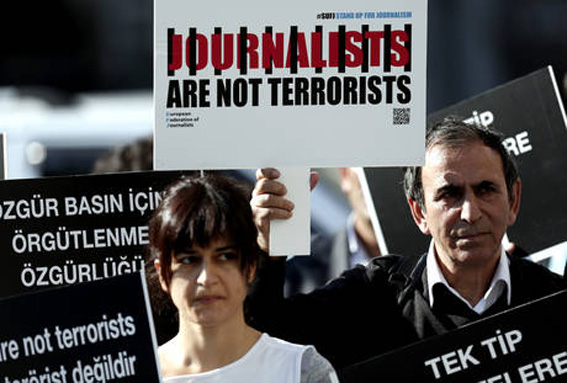
TWENTY-FOUR rights groups have called on Turkey to release all those arbitrarily detained and imprisoned there simply for demanding basic human rights – and so at risk of contracting Covid-19.
In fact, in the early hours of Tuesday 14 April, the Turkish Parliament passed a law which will lead to the release of up to 90,000 prisoners.
It excludes, however, scores of journalists, human rights defenders, politicians, lawyers and others arbitrarily detained pending trial or serving sentences following unfair trials under Turkey’s anti-terrorism laws – which facilitate incarceration for the exercise of free speech.
‘While we welcome any measures taken to alleviate overcrowding in Turkey’s prisons,’ commented the International Federation of Journalists (IFJ) on such arbitrary detentions, ‘the new measures unjustifiably exclude tens of thousands who are imprisoned for the peaceful exercise of their rights.
‘ARTICLE 19, Punto24 and the 22 undersigned organisations call on the Turkish authorities to take immediate steps to fulfil their human rights obligations by releasing all those arbitrarily detained for exercising their right to freedom of expression, and help mitigate the threat caused by the Covid-19 public health pandemic.
‘The adoption of the law, which is part of the government’s judicial reform strategy announced in 2019, was fast-tracked in light of the Covid-19 pandemic and the need to alleviate overcrowding in Turkey’s prisons. The new law comes into force as Turkey’s Justice Ministry has announced the death of three prisoners from Covid-19 on 13 April.
‘The new law does not apply to individuals in pre-trial detention, and also excludes anyone convicted of terrorism-related crimes, espionage or crimes against the intelligence services – laws which are frequently used to prosecute journalists, human rights defenders and others.
‘This means many thousands of individuals whose only crime is the exercise of their right to freedom of expression are effectively excluded from release and are at increased risk of contracting the disease in prison.
‘Among them are Ahmet Altan, 70, who is awaiting appeal after being sentenced to 10.5 years in prison for “aiding a terrorist organisation without being its member”, on the basis of his expression of political views, his previous role as editor of Taraf newspaper, and alleged contacts.
‘It also includes businessman Osman Kavala, who has been in pre-trial detention for over two and a half years, currently on the charge of “espionage” and Kurdish politician Selahattin Demirtas, who has been in prison since November 2016 and whose release has been repeatedly blocked despite a European Court decision ordering it.’
- Turkey marked 100 years of the foundation of the Turkish Parliament, with official ceremonies held and attendees abiding by social distancing and curfew rules amid the novel coronavirus pandemic.
The country celebrates the establishment of parliament with National Sovereignty and Children’s Day on April 23 every year, as it was bestowed by Mustafa Kemal Atatürk, the founder of the Republic of Turkey, at the opening ceremony of parliament.
Although Sovereignty Day is being marked for the 100th time this year, it was 1979 when the day started to be called ‘International Children’s Day’ and the state-run Turkish Radio and Television Institution (TRT) started a festival called ‘TRT International April 23 Children’s Festival’.
On its first year, Turkey hosted children from the USSR, Iraq, Italy, Romania and Bulgaria, and went on to host thousands of children from 150 different countries over 39 years.
Mustafa Kemal Atatürk (until 1934: Mustafa Kemal Pasha or alternatively written as Kamâl Atatürk, 1881 – 10 November 1938) was a Turkish field marshal, revolutionary statesman, author, and the founder of the Republic of Turkey, serving as its first President from 1923 until his death in 1938.
His leadership undertook sweeping progressive reforms, which modernised Turkey into a secular, industrial nation.
Ideologically a secularist and nationalist, his policies and theories became known as Kemalism. Due to his military and political accomplishments, Atatürk is regarded according to studies as one of the greatest leaders of the 20th century.
Atatürk came to prominence for his role in securing the Ottoman Turkish victory at the Battle of Gallipoli (1915) during World War I. Following the defeat and dissolution of the Ottoman Empire, he led the Turkish National Movement, which resisted mainland Turkey’s partition among the victorious Allied powers.
Establishing a provisional government in the present-day Turkish capital Ankara, he defeated the forces sent by the Allies, thus emerging victorious from what was later referred to as the Turkish War of Independence.
He subsequently proceeded to abolish the decrepit Ottoman Empire and proclaimed the foundation of the Turkish Republic in its place.
As the president of the newly formed Turkish Republic, Atatürk initiated a rigorous programme of political, economic, and cultural reforms with the ultimate aim of building a modern, progressive and secular nation-state. He made primary education free and compulsory, opening thousands of new schools all over the country.
He also introduced the Latin-based Turkish alphabet, replacing the old Ottoman Turkish alphabet. Turkish women received equal civil and political rights during Atatürk’s presidency ahead of many Western countries. In particular, women were given voting rights in local elections by Act no. 1580 on 3 April 1930 and a few years later, in 1934, full universal suffrage, earlier than most other democracies in the world.